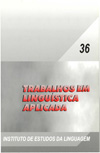Resumo
In a recent interview published by Folha de São Paulo, Paulo Henrique Britto, one of our most prolific translators of literature, talks about his craft and defends his brand of translation ethics: "when we are translating, we have to give up the notion of authorship. If I think that the book is written, I try to write it [in Portuguese] in the worst possible manner. The translator has to be modest, but talking about modesty is very hard these days." Britto refers to some trends in contemporary translation studies which defends the authorial participation of translators in the rewriting of the original, proposing a reevaluation of all the common places which have underestimated translation's pivotal role in the formation of cultural identities. As I try to show in my discussion of Britto's ideas, no matter how hard he tries to be "invisible" in the work he does as a translator, such work will always reveal his interpretation of the original, his particular choice of words, his world view, his circumstances. In a nut shell, as Maurício Santana Dias, his interviewer, puts it, Britto is inevitably "responsible for the Brazilian accent with which Thomas Pynchon, John Updike, V. S. Naipaul and Salman Rushdie", among others, end up having in the Brazilian versions of their novels. As Britto denies such a "responsability," it is possible to argue that what he calls "modesty" is in fact a desire for the absolute control of his authors' texts and meanings.O periódico Trabalhos em Linguística Aplicada utiliza a licença do Creative Commons (CC), preservando assim, a integridade dos artigos em ambiente de acesso aberto, em que:
- A publicação se reserva o direito de efetuar, nos originais, alterações de ordem normativa, ortográfica e gramatical, com vistas a manter o padrão culto da língua, respeitando, porém, o estilo dos autores;
- Os originais não serão devolvidos aos autores;
- Os autores mantêm os direitos totais sobre seus trabalhos publicados na Trabalhos de Linguística Aplicada, ficando sua reimpressão total ou parcial, depósito ou republicação sujeita à indicação de primeira publicação na revista, por meio da licença CC-BY;
- Deve ser consignada a fonte de publicação original;
- As opiniões emitidas pelos autores dos artigos são de sua exclusiva responsabilidade.
Downloads
Não há dados estatísticos.

